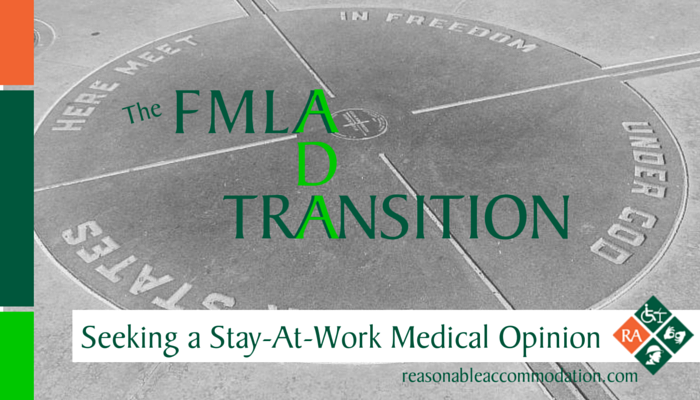The border between the Family and Medical Leave Act (FMLA) and the Americans with Disabilities Act, Title I (ADA) is an interesting landscape. In some ways it resembles the Four Corners National Monument near Teec Nos Pos, Arizona: determining where one is depends on where you placed your feet. Further, where one stands determines the answer to an often asked question.
“If the employer is not satisfied with the employee’s health care provider’s certification (under FMLA), may the employer restore the employee to work, but then seek its own evaluation of the employee’s fitness for duty at its own expense (under the amended ADA).”
My lay reading of a recent case heard in the Court of Appeal of the State of California (see: Susan White v. County of Los Angeles) reveals the answer is “yes”.
This finding fits with the idea of allowing the employee to do her job without conducting medical examinations that are not job-related and consistent with business necessity. 29 U.S.C. § 2601 and its supporting code, says clearly that when an employee takes leave under the FMLA, the employee is entitled to be restored to employment upon certification from the employee’s health care provider that the employee is able to resume work. The employer is not permitted to seek a second opinion regarding the employee’s fitness for work prior to restoring the employee to employment.
But how does an employer proceed if there are concerns about the employee’s safe ability to conduct the essential functions of the job? To take advantage of the benefits of Title I, the employer’s responsibility begins with clearly and purposefully returning the worker to work. Restore the individual to the job to which he or she was attached. Treat the individual as you would treat any other fully qualified and effective worker.
At this return to work point the employee and the employer have access to the benefits of Title I which includes such concepts as essential function, reasonable accommodation, and warranted post-return-to-work medical examination (not “post-offer” or conditional hire medical examination).
Next, follow the routine process of observing the worker’s ability to efficiently and safely carry-out the essential functions of the job. Rely on the normal channels of communication to report concerns about a worker’s safe ability. (White’s job as a Senior District Attorney Investigator with the Los Angeles County District Attorney’s Office somewhat complicates this discussion as she was required to carry a weapon. This fact draws in regulations from other government codes that address the requirements of a peace officer’s job related to carrying a weapon.)
When the ADA was updated in 2008 the Department of Labor stated, “An employer may not require that an employee submit to a medical exam by the employer’s health care provider as a condition of returning to work. A medical examination at the employer’s expense by an employer’s health care provider may be required only after the employee has returned from FMLA leave and must be job-related and consistent with business necessity as required by the ADA. Thus, if an employer is concerned about the health care provider’s fitness-for-duty certification, the employer may, consistent with the ADA, require a medical exam at the employer’s expense after the employee has returned to work from FMLA leave as stated in paragraph (h) in the final rule. The employer cannot, however, delay the employee’s return to work while arranging for and having the employee undergo a medical examination.” (73 Fed. Reg. 67934-01,68033)
Concerned about the FMLA to ADA Title I boundary? Join us for the Reasonable Accommodation Workshop.




